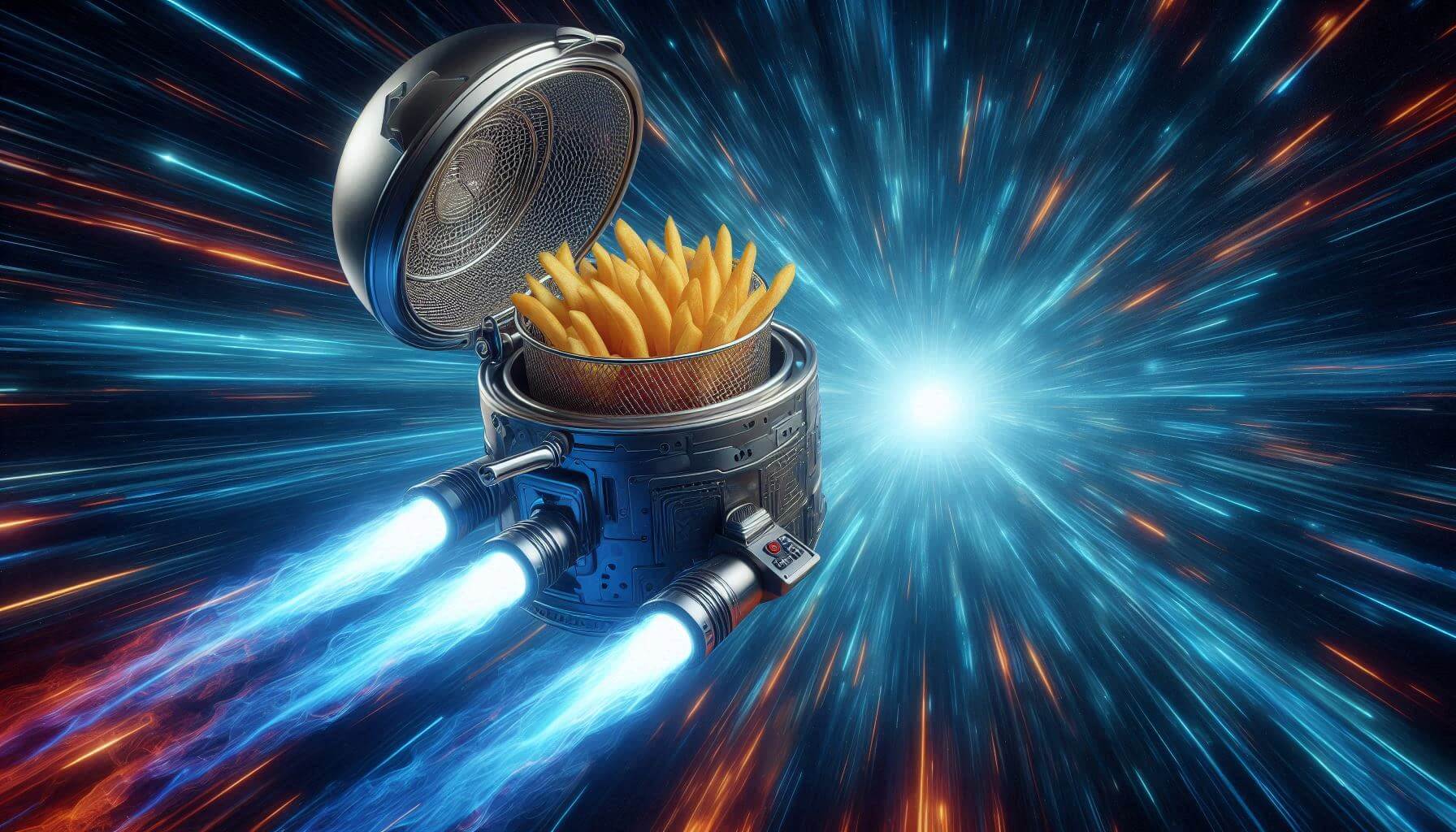Innovations in Deep Frying: New Technologies
by Nathen Dubé

If you’re deep fryer can do this, you win. At what? Everything.
Deep frying has long been a cornerstone of culinary practices, delivering crispy and flavorful dishes that delight guests, and it’s ready for innovation.
Traditional frying methods can be inefficient, costly, and environmentally unfriendly. The evolution of deep frying technology in modern kitchens has focused on addressing these issues by enhancing efficiency, reducing oil usage, and promoting sustainability.
Let’s explore the latest innovations in deep frying, focusing on oil-conserving fryers and new technologies that are transforming the industry.
Oil-Conserving Fryers and Their Benefits
Oil-conserving fryers represent a significant advancement in kitchen technology. These modern fryers are designed to reduce oil usage and operational costs while maintaining high-quality frying standards.
By optimizing the use of oil, these fryers help restaurant operators lower their expenses and minimize waste, making them an attractive option for eco-conscious businesses, and those looking to improve their bottom line.
How These Fryers Reduce Oil Usage
Oil-conserving fryers achieve their efficiency through several mechanisms.
They often feature advanced filtration systems that keep the oil cleaner for longer periods, reducing the frequency of oil changes. Efficient oil circulation methods ensure that heat is distributed evenly, which not only improves cooking consistency but also extends the oil’s usable life.
Precise temperature controls prevent the oil from overheating and breaking down, further conserving this valuable resource.
Overview of Their Role in Modern Culinary Practices
In modern culinary practices, oil-conserving fryers play a crucial role in enhancing both operational efficiency and sustainability. They allow chefs to produce high-quality fried foods with less oil, reducing costs and environmental impact.
These fryers are particularly valuable in high-volume settings such as fast-food chains, casual dining establishments, and catering operations, where oil usage is typically high.
Key Features of Modern Fryers
Advanced Filtration Systems to Maintain Oil Quality
One of the standout features of modern oil-conserving fryers is their advanced filtration systems. These systems filter out food particles and debris continuously, keeping the oil clean and extending its life.
This not only reduces waste but also ensures that the food maintains a consistent taste and texture.
Efficient Oil Circulation Methods for Consistent Cooking
Efficient oil circulation is essential for consistent cooking. Modern fryers are designed to circulate oil evenly around the food, preventing hot spots and ensuring uniform cooking.
This technology helps achieve perfect results every time, whether frying chicken, French fries, or other popular items.
Temperature Controls for Precise Frying and Energy Efficiency
Precise temperature controls are another critical feature of modern fryers. These controls allow chefs to set and maintain the exact temperature needed for different foods, ensuring optimal cooking conditions.
By preventing overheating, these controls also enhance energy efficiency, and prolong the life of the oil.
New Technologies in Deep Frying
Introduction to Low-Oil Volume Fryers and Their Advantages
Low-oil volume fryers are a recent innovation designed to use significantly less oil than traditional fryers. These fryers maintain high performance while reducing the amount of oil required, leading to lower operational costs and less waste.
They are ideal for small to medium-sized establishments looking to improve their sustainability without compromising on food quality.
The Concept and Benefits of Pressure Frying
Pressure frying is another innovative technology that has gained popularity in commercial kitchens.
This method uses a sealed environment to cook food at higher pressures and temperatures, resulting in faster cooking times, and less oil absorption. Pressure frying not only produces crispier and juicier food but also enhances energy efficiency, and reduces oil consumption.
Smart Automation: Integration of Technology for Ease of Use and Consistency
Smart automation is revolutionizing the way commercial kitchens operate. Modern fryers equipped with smart technology can automate various aspects of the frying process, from maintaining oil quality to adjusting cooking times and temperatures.
These automated systems ensure consistency, reduce the margin for human error, and free up staff to focus on other tasks.
Health and Environmental Benefits
Reduced Oil Absorption in Food for Healthier Outcomes
Innovative frying technologies contribute to healthier food by reducing oil absorption. Low-oil volume and pressure fryers, in particular, produce fried foods that are less greasy, and lower in fat.
This health benefit is increasingly important as consumers become more health-conscious, and demand healthier menu options.
Decreased Waste Generation and Its Positive Environmental Impact
Reducing oil usage and waste generation has significant environmental benefits. By extending the life of frying oil and using less of it overall, oil-conserving fryers help decrease the volume of waste oil that needs disposal.
This reduction in waste contributes to a smaller environmental footprint, and supports more sustainable kitchen practices.
The Role of Innovative Fryers in Promoting Sustainable Cooking Practices
Innovative fryers are at the forefront of promoting sustainable cooking practices. By conserving resources and minimizing waste, these technologies align with the growing trend toward sustainability in the food industry.
Restaurants that adopt these practices can not only reduce their environmental impact but also appeal to environmentally conscious guests.
Insights on the Future of Frying Technologies and Industry Trends
The future of frying technologies looks promising, with ongoing innovations aimed at further improving efficiency and sustainability.
Industry trends indicate a continued focus on reducing environmental impact and enhancing food quality, with smart automation playing an increasingly important role.
Practical Tips for Choosing and Using Fryers
Key Considerations for Selecting the Right Fryer for Your Kitchen
Choosing the right fryer for your kitchen involves several considerations, including the volume of food you need to produce, the type of food you serve, and your budget.
It’s essential to evaluate the features and capabilities of different fryers to find one that meets your specific needs.
Best Practices for Maintaining Fryers to Extend Their Lifespan and Efficiency
Proper maintenance is crucial for extending the lifespan and efficiency of your fryer.
Cleaning and filtering the oil regularly, checking and calibrating temperature controls, and performing routine inspections are all vital practices. Following the manufacturer’s maintenance guidelines will help ensure optimal performance.
Importance of Staff Training to Maximize the Benefits of New Technologies
Staff training is essential to maximize the benefits of new frying technologies.
Ensure that your kitchen staff are well trained in operating and maintaining the equipment. Regular training sessions can keep staff updated on best practices and new features, helping to improve efficiency and food quality.
Conclusion
The advantages of oil-conserving fryers and new frying technologies are clear: these innovations offer significant cost savings, improved food quality, and enhanced sustainability.
Adopting these advanced solutions make it possible for restaurants to reduce their operational costs, minimize their environmental impact, and provide healthier menu options. As the industry continues to evolve, it’s crucial for restaurant owners and chefs to stay informed about the latest technologies, and invest in equipment that supports their business goals and values.
In conclusion, adopting innovative frying technologies is not just a trend but a smart business decision. The benefits of reduced oil usage, improved efficiency, and enhanced sustainability make these technologies a valuable addition to any commercial kitchen.
By prioritizing the integration of these advanced fryers, restaurants can achieve greater success, and contribute to a healthier and more sustainable food industry.
Image: Microsoft Designer

Book Below to Setup a 30-Minute Complimentary Discovery Call and Request for Proposal.
